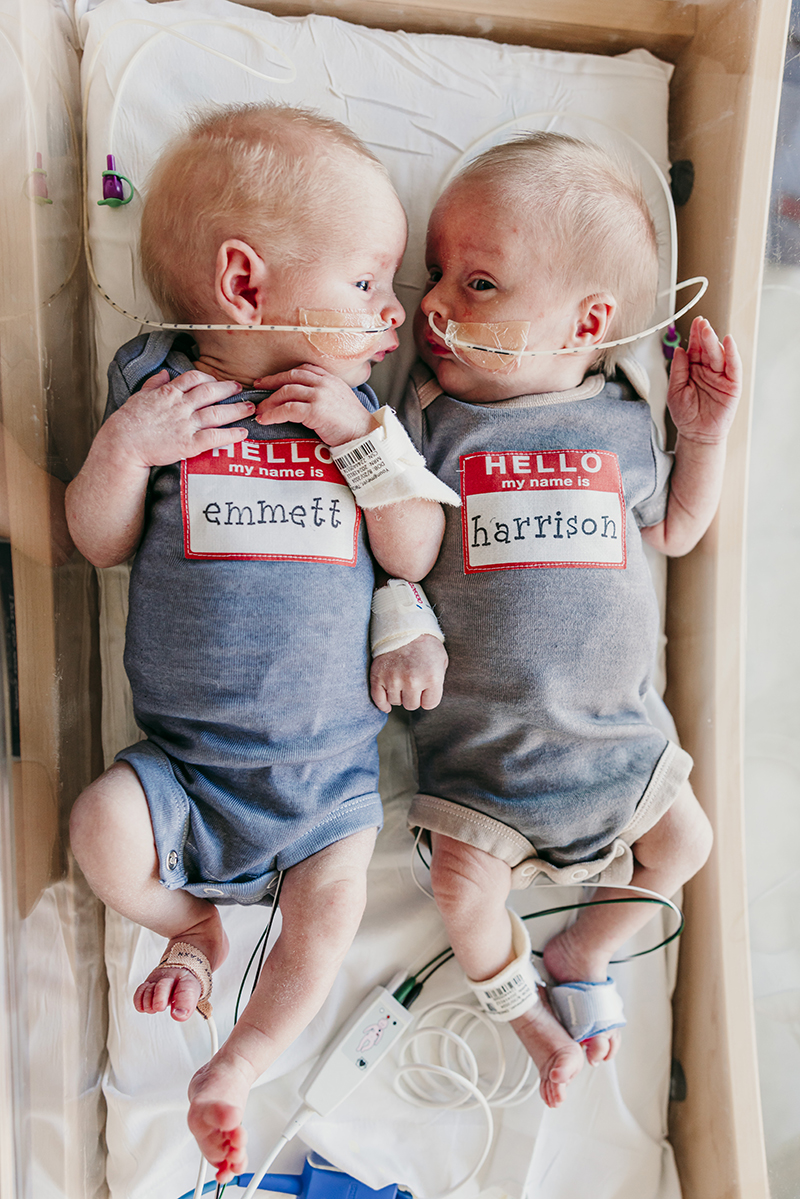St. Louis Children’s Hospital employee helps MoBap’s milk bank reach new milestone
Expecting moms understandably have a lot on their minds.
For Katie Youngmeyer, a lot was an understatement.
Last summer, Katie, a feeding therapist at St. Louis Children’s Hospital, and her husband, Klint, were preparing to welcome twin boys while also helping their two daughters adjust to the idea of becoming big sisters. Then everything sped up. Katie experienced preterm labor, meaning her sons were coming earlier than expected and would require a lengthy stay in the Newborn Intensive Care Unit (NICU).
Suddenly Katie and Klint had to decide how to feed their boys until Katie could breastfeed, which she preferred.
A stressful, scary situation got a little easier, thanks to Missouri Baptist Medical Center. MoBap’s work with OhioHealth Mothers’ Milk Bank allows families to benefit from donated breast milk and made the hospital a drop-off location for mothers who wish to donate.
Katie’s now done both.
A huge relief
 On Aug. 20, 2024, at MoBap, Harrison and Emmett Youngmeyer were born at 34 weeks and four days gestation.
On Aug. 20, 2024, at MoBap, Harrison and Emmett Youngmeyer were born at 34 weeks and four days gestation.
The brothers remained under the watchful eye of the NICU staff for more than a month so their growth could be carefully monitored. Fortunately, Katie’s body started producing breast milk just a few days after the boys’ birth. Until then, a small amount of donated breast milk went a long way.
“To be provided with donor milk instead of having them transition to formula right away was such a huge relief,” Katie says. “The staff was able to talk to us about the benefits and why they recommend it over providing formula from the get-go. It was then easy for them to transition to my milk.”
For premature babies, the benefits of breast milk are significant. It helps support developing immune systems, promotes healthy brain and organ development, and reduces risks of serious infections and complications.
Safety as a priority
With her daughters, 5-year-old Avery and 2-year-old Isla, Katie learned her body tends to produce more milk than her children need.
Katie had donated milk in the past, before the 2024 launch of MoBap’s milk bank drop-off location, by relying on online groups that connect families with donors. When she decided she wanted to donate again, she knew where she would go moving forward. She trusted the safety protocols followed by MoBap and OhioHealth Mothers’ Milk Bank.
“Donors are so thoroughly vetted,” Katie says. “It’s a little bit of a process, and rightfully so. That makes me feel better, as someone who has received that milk. I know it’s safe.”
Katie’s screening process to donate included providing letters from doctors, completing multiple rounds of lab work and a check of the medications she takes, and more. Donors go through a medical and lifestyle review along with comprehensive blood tests during a process that can take up to a month. Donated milk is then pasteurized and checked for any potential bacteria before it is distributed to babies in need.
Katie checked all the boxes to donate, then checked her freezer.
Even with twins, it was getting full.
A big delivery
After consulting with MoBap’s Infant Feeding Clinic team, Katie determined she had enough milk stored to start donating again.
She then made her first milk drop at MoBap, handing over nearly 1,500 frozen ounces carefully stacked into a bulging freezer bag.
For context, a newborn’s stomach capacity is 5–7 milliliters or 0.17–0.24 ounces—about half the height of a cherry when poured into a bottle—during the baby’s first few days. At one month, a baby’s stomach capacity is 80–150 milliliters, or about 3–5 ounces. In theory, Katie’s donation could have helped feed more than 200 newborns for a day, or a single month-old baby for about a week and a half.
These numbers help illustrate why milk banks celebrate milestones, like the recent one of 5,000 ounces collected via donation at the MoBap milk drop location, where 15 donors have contributed, with several donating more than once.
“It was such a relief, and I was so blessed to have that as an option for the boys,” Katie says. “We are so grateful for all the care we received in the NICU. Everyone, the entire team, was so wonderful. It was one little thing we could do to give back. I can’t give them money, but I can give them something they can use and know it’s going to go back to the families that team is helping.”
Harrison and Emmett recently turned 9 months old. They now weigh about 17 pounds each.
“They’re big, strong boys,” Katie says. “They’re doing great. Sitting, rolling all over the place, sleeping well—finally.”
Katie’s second donation drop at MoBap, delivered recently, totaled more than 300 ounces.
Learn more about the benefits of donor milk or how to become a donor.
